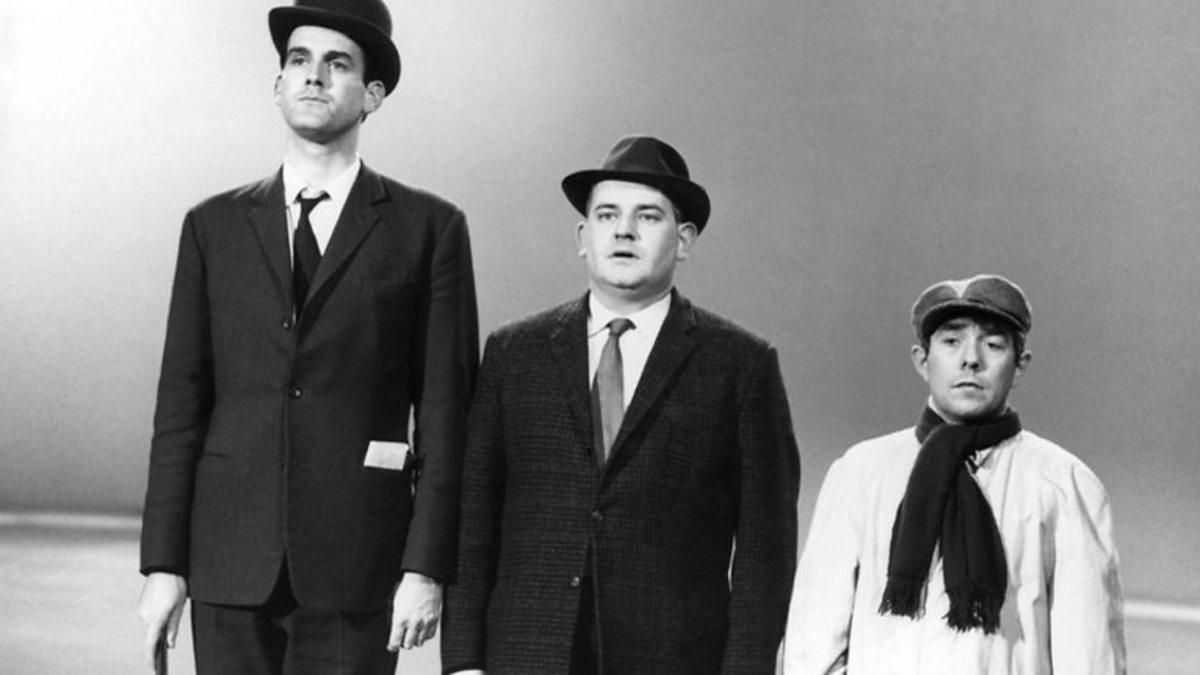An upper-middle-class former banker friend recently attended a Reform UK selection meeting for council candidates in a decaying southern coastal town. Although he is a man of the world who once worked on oil rigs and in a shoe shop, my banker friend professed himself ‘shocked’ by the standards of dress and deportment of the other would-be candidates. Naturally all were overweight and tattooed, and all were dressed in shorts, baseball caps and hooded tracksuit tops – the standard everyday uniform of most British men under the age of 60. They were, it is fair to say, an average representation of the male members of what was once called ‘the working class’.
The story reminded me of that classic TV sketch from the early 1960s. You know the one: a conveniently tall John Cleese in a bowler hat as the ruling upper-class chap literally looking down on his inferiors. The late two Ronnies, Barker in the middle, wearing a trilby as the typical middle-class exemplar, and the diminutive Corbett at the end, clad in cloth cap as the downtrodden ‘Prolier than thou’ working-class man.
I fear that Karl Marx, were he to return today, would feel shocked at what has become of his beloved proletariat, who he prophesied would seize power from the decadent bourgeoisie. The aspirant Reform councillors, when they were employed, didn’t work in factories, steel mills or coal mines: they were in jobs like Amazon or Deliveroo, supermarket checkouts, or they had plumbing or small IT businesses. Far from planning to usurp their bourgeois betters, they are intent on joining them.
As a result, Barker’s middle class has swelled like a bursting carbuncle, driving the Corbett class below him – the tattooed class – into shrinking enclaves like coastal towns and former industrial cities. The political allegiances of the classes have been turned inside out since the 20th century: the middle-class Tories of old are a tiny minority since most middle-class people now read the Guardian, vote Labour, Green or Lib Dem, dabble with veganism, snort cocaine and join their kids at weekends on pro-Palestinian marches.
Meanwhile, the tattooed class beneath them – the ‘oiks’ who used to vote Labour, join trade unions, frequent pubs and greyhound tracks, read the Sun and watch Corrie or EastEnders – are flocking to Reform, get their news entirely from social media, and God only knows what they get up to at weekends.
Even the new divides of race and religion are class-driven: Islamist terrorists and grooming gangs speak with northern accents straight out of Corrie and support Man City, Leicester or Leeds, while the security staff employed in a vain bid to deter shoplifters are mostly Asian for some reason.
It has never been a better time to be a black actor: roles which used to be restricted to whites, like Hamlet, are not only open to black men. By an unwritten showbiz law, every production must now boast a racially mixed cast. Even if you never aspire to play the Dane, there will always be a part for you as the obligatory black member of a mythical middle-class white family in a TV ad.
Class divisions today are as easy to identify as they were in Victorian times: if you know the way someone voted in the Brexit referendum, for instance, you will also know, without asking, their stance on Gaza, where they take their holidays and their tastes in booze. The progressive middle class do their shopping in Waitrose or M&S, while the tattooed class are found in Poundland or Lidl. Progressives haunt gyms and worry about their weight, while the tattooed class vape, enjoy sausage rolls in Greggs and ride around on mobility vehicles even when they are quite capable of waddling.
I have no friends or even acquaintances among the tattooed class
If this sounds like the observations of a snob, I must plead guilty: I have no friends or even acquaintances among the tattooed class, and their sexual, social and leisure customs are as mysterious to me as a holiday at Bognor’s Butlins. I would discourage my daughter from marrying a tattooed man with the same horror that a 20th-century bourgeois lady would have shown if her favourite son had admitted he was gay.
I have no idea why class difference is such a strong and persistent feature of British life compared to our closest European neighbours. My banker friend puts it down to private education as opposed to state schools. That is certainly a factor, but I think that the British are happier and more comfortable immured in their own class, even – or especially – when they pretend not to be.
A couple of illustrations from my own life may show what I mean. My first serious girlfriend was German, and my dear mother, despite vividly remembering the Blitz, eventually reconciled herself to the relationship and even set her heart on wedding bells. Mama also had a fear of flying. She pretended not to, claiming she was boycotting South Africa because of her principled opposition to apartheid. Yet when I started going out with a black woman with a strong Glaswegian accent, mother was appalled.
Later, when living in Brighton, capital city of the progressive middle classes, I had an Asian girlfriend. My next-door neighbour – as ardent a members of the Guardian-reading, muesli-munching and Green-voting class as you could wish (not) to meet – actually took the trouble of calling round to question me. He wanted to make sure I was not about to sell my house to my brown-skinned girlfriend, lest such a sale should detract from the value of his own property. Hypocrisy, I suggest, rather than tolerance or fair play, is the most typical and lasting British value, no matter what class you belong to.







Comments